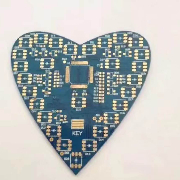Flexible PCB boards are printed circuits made of flexible insulating substrates, and have many advantages that rigid PCB boards do not have:
1. It can be bent, wound, and folded freely, can be arbitrarily arranged according to the space layout requirements, and can be moved and expanded in three-dimensional space, so as to achieve the integration of component assembly and wire connection;
2. The use of FPC board can greatly reduce the volume and weight of electronic products, which is suitable for the development of electronic products in the direction of high density, miniaturization and high reliability. Therefore, FPC has been widely used in aerospace, military, mobile communications, laptop computers, com...
Flexible PCB boards are printed circuits made of flexible insulating substrates, and have many advantages that rigid PCB boards do not have:
1. It can be bent, wound, and folded freely, can be arbitrarily arranged according to the space layout requirements, and can be moved and expanded in three-dimensional space, so as to achieve the integration of component assembly and wire connection;
2. The use of FPC board can greatly reduce the volume and weight of electronic products, which is suitable for the development of electronic products in the direction of high density, miniaturization and high reliability. Therefore, FPC has been widely used in aerospace, military, mobile communications, laptop computers, computer peripherals, PDAs, digital cameras and other fields or products;
3. Flexible pcb board also has the advantages of good heat dissipation and solderability, easy assembly and low overall cost, etc. The design of Rigid-flex PCB also makes up for the slight deficiency of the flexible substrate in the component carrying capacity to a certain extent.
